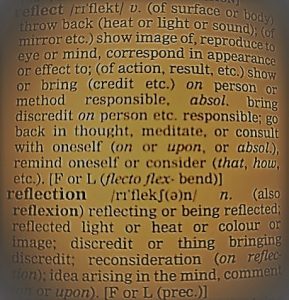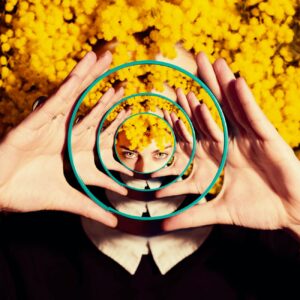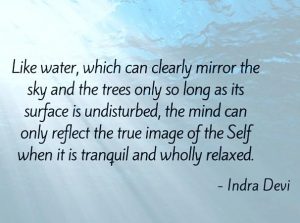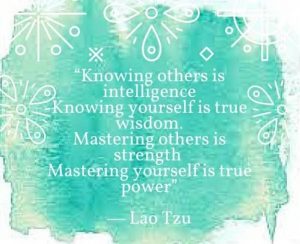Reflection [ri-flek-shuhn]. / meditation, contemplation, deliberation, pondering, musing, study, impression
Before putting pen to paper I did much contemplating, pondering and musing on what ‘reflection’ meant to me. Three aspects of reflection spoke to me at this point in my life.
- Reflection & Language
My 9 year-old son has dyslexia and RAN (Rapid Automatic Naming). One of the paths we are taking to empower him involves strengthening his reading, writing and spelling with Multi-sensory Structured Literacy. A component of this is bringing in really strong phonological awareness and working with a language therapist regularly.
I have become Jimmy’s advocate and teacher at home. I love language, reading and writing and so I’m relishing this opportunity to learn more about linguistics and how to best teach my son.
In regards to the actual word ‘reflection’, in breaking it down we see that ‘re’ is a prefix meaning ‘again, retell, come back to’. Flection dates back to the 14th century and stems from the Latin word flexio which is an act of bending, curving, going in a different direction.[1]
What if we used the power of the word reflection as an opportunity to come home to a malleable state; to again and again bend and curve so as to move with life in a graceful way?
The experience of appreciating language with my son as well as listening to a recent podcast on Sounds True with Caroline Myss on the topic of ‘The Power of Holy Language’[2] has led me to reflect on the potency and wonder of language. Caroline speaks of the holiness of language and its ability to help us understand ourselves and our world.
A definition of reflection is ‘the throwing back by a surface of light without absorbing it’ [3]. How holy and wonderful is this meaning? That light can create a mirror image of something without absorbing it? That there exists the possibility of re-creating an image without losing the essence of the original?
Reflection also means: meditation, contemplation, deliberation, pondering, musing, study, impression. My contemplation of the word reflection feels like an invitation into the divine, into the holy, into light. When we consider the magic of words, their history, meaning and intention then language becomes holy. The word Reflection holds a sacredness.

- Reflection & The Mirror
There is nothing like having children to really reflect your values, attitudes and behaviour back to yourself! I often think it is easy to be pious, nice and ‘spiritual’ when I’m leading a Yoga class, but the real work begins when I’m off the mat and relating to others, particularly my family.
There are moments when my children reflect aspects of myself that I am fond of – respect, kindness, generosity and understanding. And there are moments when my children reflect aspects of myself that are not so endearing – judgement, foul language and moodiness. I have to honour the wholeness of both the child and myself in these moments, knowing that yin/yang, the light and the shadow lives within all of us.
When behaviour or beliefs are reflected back to us, we have a choice to acknowledge our own self or deny it and blame the other person. I find it easy to acknowledge my role in my child showing kindness to another person. It is less comfortable for me to acknowledge that when my teenage daughter is moody and distant that this too is something that I have modelled to her on occasions.
Entrepreneur, author and motivational speaker, Jim Rohn, believes that “You are the average of the five people you spend the most time with” [4]. He highlights that we are greatly influenced by our relationships. While this view may not be fool-proof, I think we all know this to some extent. When we are surrounded by positive, caring, inspirational people we tend to feel positive, caring and inspired ourselves.
A neighbour recently did a temporary job where she was working with a group of people that were unmotivated, had negative attitudes and a general lack of respect. She shared with me that what got her down about that job was not the menial nature of the actual work but the constant negativity of the people she was working with.
Further research has suggested that it’s not just the five people that we mostly relate to that influence us but that it’s much wider than that. [5] Our families, our workmates, our community, our culture all influence our lives. This can be in a positive or a negative way. Either way there is an opportunity for self-reflection on how we respond to people and situations; how we can empower ourselves to carve our own path rather than be defined by our immediate environment.
Energetically we shine a light in the world which is reflected back to us by others. In turn others shine a light which we reflect back. We are all energy interacting with and bouncing off each other and reflection exits in all relationships.
Reflection – Who do you choose to spend your time with? Do these people nourish your soul and inspire you to be your best self?

- Reflection & Svadhyaya
Svadhyaya is one of four Niyama’s which are inner observances that create respect for one’s body, mind and soul. Svadhyaya relates to self-study and self-reflection.
The word itself is made up of Sva, meaning own, self, or the human soul, and Adhyaya, meaning lesson, lecture, or reading, and can imply the practice of studying sacred text as well as the practice of studying the Self. [6]
Study of Scriptures
Traditionally the study of scriptures in the Yoga lineage would have been the study of ancient spiritual texts such as the Bhagavad Gita, the Hatha Yoga Pradipika and the Yoga Sutras of Patanjali. In Christianity it is the study of the bible. In Islamic faith it is The Quran and Hadith. There are various scriptures and sacred texts from ancient cultures, religions and faiths.
A devout Yogin may read the Yoga Sutras and return to them time after time as a depth of meaning and understanding grows within the practitioner. Perhaps they chant The Vedas or seek deeper meaning from The Bhagavad Gita.
Alongside ancient texts there are many modern books, poems, oracle cards, webinars, podcasts and blogs that provide wise, spiritual and uplifting content regarding living a soulful life.
And while studying spiritual texts is a wonderful form of svadhyaya, the real gift is in applying the wisdom from these sacred messages into our day to day lives. This is where svadhyaya as self-study or reflection comes into play.

Self-Study
One can consider that self-study is a form of reflection. By reflecting on our attitudes, beliefs and values we gain an awareness of what serves us and what hurts us. Some behaviours are reactive, fearful, egoic and not of our true nature. Other behaviours are loving and pure which brings union of all parts of self and the divine.
Reflection is an opportunity to heal and grow. We can do this through meditation, journaling, pranayama, asana, conscious movement, counselling, holistic healing and being in nature. It requires that we stop doing and start being.
Patanjali’s Yoga Sutra II.44 says, “Study thy self, discover the divine”. [7] This statement acknowledges that inherently we are divine and practicing reflection brings us home to this truth.
For me personally, as a Highly Sensitive Person, daily reflection is necessary to my well-being. Reflecting on grace, beauty and oneness while being in nature. Reflecting on my true nature while in meditation. Reflecting on how I really feel when practicing pranayama and asana. Reflecting on my deepest truth when I journal. I believe that reflection is necessary for living a soulful life.
Reflection – what soulful blogs, books, oracle cards or teachers inspire you to live soulfully? How do you practice self-reflection?

[1] https://www.merriam-webster.com/dictionary/reflection
[2] https://open.spotify.com/episode/0Dk4OcG2hlzE3dXjn3TfzA?si=ZEp1VGYWTCqjMqfrQ6PQ0g
[3] https://www.merriam-webster.com/dictionary/reflection
[4] https://www.developgoodhabits.com/five-people/
[5] https://medium.com/the-mission/youre-not-the-average-of-the-five-people-you-surround-yourself-with-f21b817f6e69
[6] https://www.ekhartyoga.com/articles/philosophy/the-niyamas-svadhyaya-or-self-study)
[7] https://en.wikipedia.org/wiki/Sv%C4%81dhy%C4%81ya
